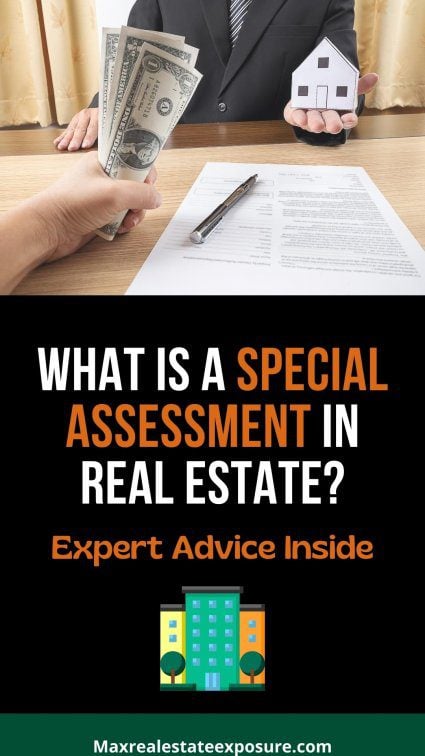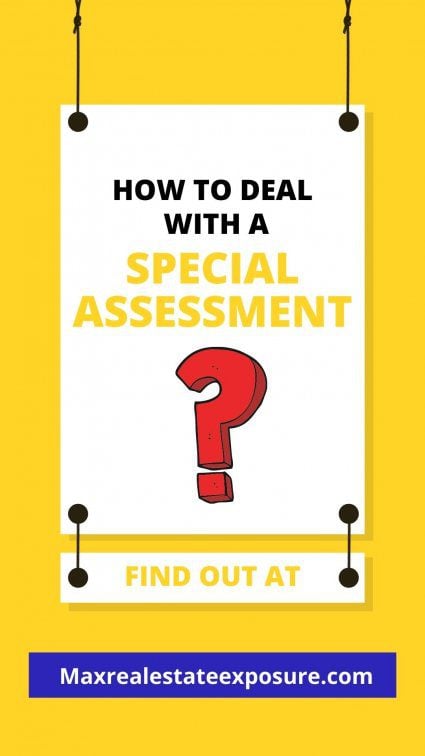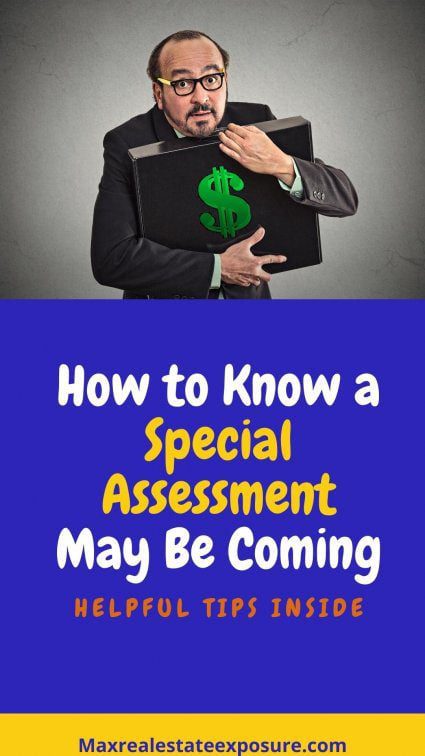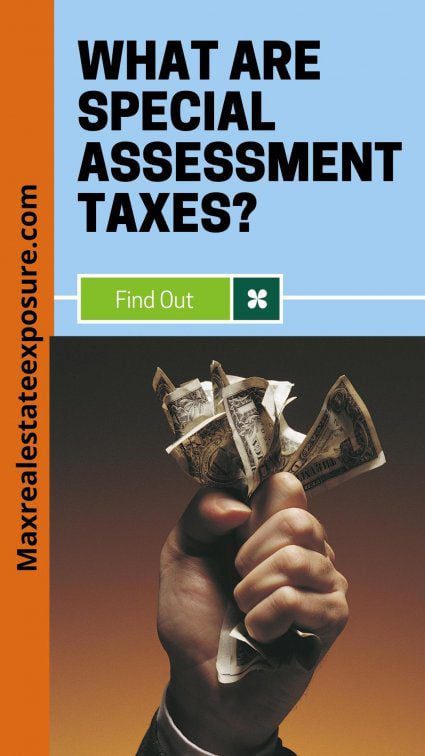How HOA Special Assessments Work in Real Estate
 Are you wondering what a special assessment is and how they work?
Are you wondering what a special assessment is and how they work?
When buying a condo or a townhome, you should have a firm grasp of the meaning of special assessments.
So, what is a special assessment, and how will it affect you?
A special assessment is a designated amount of money that all owners in a development run by an HOA will pay for necessary improvements. Typically, a special assessment is a one-time fee that covers the essential repair or modification.
If your homeowners’ association has announced a special assessment, you would be right to have some concerns.
An HOA special assessment will usually be created to deal with an unexpected expense in the development.
For example, if a hurricane damaged all of the roofs in the neighborhood and they need replacement, a special assessment could be collected to handle construction costs.
Whether you have a tight budget or not, you’ll probably want to know about any upcoming expenses associated with your purchase.
Finding out whether there are any upcoming special assessments is one of the most vital questions when purchasing a condominium or townhouse.
Let’s take a look at everything to know about special assessments.
What is a Special Assessment in Real Estate?
When you buy a home in an HOA-managed community, you will have signed your name on the contracts and agreed to follow their bylaws. When the board members of the HOA decide that repairs are needed, homeowners could be required to pay a special assessment.
A property owner will sign governing documents that explain how assessment fees will work when needed.
The homeowners association should have a reserve fund to cover repair bills, but it doesn’t always work out that way. If repairs are required, that will cost more than is available in the reserve account; an HOA special assessment might be needed.
When the HOA hasn’t been as well managed as possible, they must ask the homeowners for more money. Sometimes an emergency could arise from natural disasters, like hurricane damage to properties, as mentioned.
If, for example, a hurricane damaged the clubhouse roof, the condo association would need to pay for it.
Ultimately these expenses would be passed along to the unit owners in the form of a special assessment. Unexpected costs are not that uncommon when buying a condo.
Capital Improvement Assessments vs. Special Assessments
Sometimes confused with special assessments, capital improvement assessments are slightly different. A capital improvement assessment is concerned with improving the community areas. This could mean making structural alterations, for example.
The capital improvement should increase the value of the homes in the development and possibly provide more facilities to residents. Typically, improvement projects like this are more costly, so the HOA has to take more care before implementing them.
Examples of capital improvement projects could include building a fitness center, clubhouse, tennis courts, or additional parking lots.
All of these are improvements to common areas that unit owners can take advantage of. These HOA assessments help improve the property values of all the community members.
The HOA board often proposes capital improvement projects, and all property owners will discuss assessment fees. Voting will take place to ensure the majority approves of the capital expenditures.
Government Assessments
Municipal governments can also create special assessments if they don’t have enough reserve funds. Perhaps the government hasn’t collected as much tax as they budgeted, or they must make repairs or improvements that can’t wait.
How to Deal With a Special Assessment
 Special assessments typically happen because of something that went wrong or failed unexpectedly.
Special assessments typically happen because of something that went wrong or failed unexpectedly.
Perhaps the weather has caused damage to the roof of the complex building, and the insurance isn’t going to pay. Even the best homeowners associations could get caught off guard when something unexpected occurs.
These problems are more likely with HOAs that aren’t well run and haven’t budgeted successfully. This is one reason why researching an HOA is very important before buying a home in this type of community.
You must check the HOA’s financial details to ensure they have the funding reserves to deal with unexpected events.
It’s also prudent to check that other community members have been paying their HOA fees. Doing so will mean the association is better managed and has the finances available when needed.
While your mortgage lender might ask for these details anyway, it doesn’t hurt to check how many homeowners are behind on their monthly fees.
Special Assessments When You Are a Homeowner
As a homeowner in an HOA-controlled community, it’s more difficult to pack up and leave should the association do things you disagree with. However, you do have the option to give your opinion and possibly vote on any planned projects.
Having input will require you to attend board meetings to offer your opinion on any assessments before they happen.
More significant special assessments that are more costly to undertake will generally need the board to notify everyone. This is less likely to be the case with smaller projects.
If you don’t attend HOA meetings, you probably won’t hear about some of these smaller assessments until you get the bill.
Lower-value repair projects don’t usually require a vote either, but you will have more control over handling these things if you attend the meetings.
Monthly Fees and HOA Special Assessments
While you might want low HOA fees to pay each month, and who wouldn’t, there are downsides to this when it comes to special assessments.
Lower HOA fees will allow you to get a larger mortgage, as your lender will factor that into your other monthly costs to see how much you can afford to repay each month.
Homeowners associations with low fees are less likely to have the funds available to take care of significant repairs to the development. They are also unlikely to be ready to undertake improvement projects that will increase the value of your home.
It’s easy to assume that higher HOA fees will protect you against expensive special assessments. The association should have the funds to deal with repairs and upgrades without needing homeowners to pay more. However, this may not be the case.
Even with higher fees, if the association hasn’t collected the funds from everyone, their financial situation might not be as good as you would assume.
More considerable HOA fees could still result in an expensive special assessment if their funds aren’t well-managed.
Learning about these things before buying a home or condo would be best.
How to Know A Special Assessment May Be Coming
 Is there a way to tell if a special assessment will come shortly? As a home buyer, you should look around the neighborhood carefully to see any significant repairs needed.
Is there a way to tell if a special assessment will come shortly? As a home buyer, you should look around the neighborhood carefully to see any significant repairs needed.
Look specifically at any common areas. Is there a swimming pool or tennis court? If so, what is the condition?
Are there buildings such as a gym or clubhouse? What does the siding look like? Is it in good repair? Do any of the buildings look like they need a new roof? What is the condition of the pavement? These are the kinds of things you should be looking at.
It might also be wise to speak with a board member or property manager to get their thoughts on the potential need for a special assessment.
Make Sure You Look at The Reserve Fund
When buying a townhouse or condo, one of the essential things you need to do is look over the amount of money in the reserve fund. You want to ensure there is enough money to cover a considerable extra expense. A special assessment will be needed when disaster strikes without a solid reserve fund.
The financial statement will detail the amount of money in the reserve fund. Fiscally responsible HOAs will have an annual budget to ensure the reserve fund has ample money set aside.
Usually, an outside accountant will determine how much money should be set aside by doing a reserve study for the entire community.
Are There Limits on Special Assessments?
Specific procedures must be followed when there is a need for a particular assessment within a homeowners association. There will be governing documents that usually include the following: the articles of incorporation, declaration of covenants, conditions, restrictions, easements, and bylaws.
There could also be separate rules and regulations documenting how an HOA community can charge special assessments. It’s likely to be a specific assessment process that must be followed. There also could be an HOA special assessment limit.
Condo Special Assessment Rules
Usually, the documents will spell out if there are notice or voting requirements. It is possible there could be limitations under what events a special assessment is possible.
Prospective purchasers within a condominium association should always thoroughly review the governing documents and restrictive covenants.
Some state laws also have restricted a homeowners association’s power to charge special assessments. In some states, there are limits on the amount of money in special assessments that can be collected in a calendar year or limit an assessment over a certain amount without taking a vote.
Before signing a purchase contract, it makes sense to research what you’ll potentially be on the hook for if a special assessment is needed.
Can Special Assessments Happen if You Don’t Own a Condo?
An HOA special assessment can happen even if you don’t live in a condo or townhouse. Any community governed by the rules of a homeowners association or a residential owners association can have to deal with special assessments.
Local government special assessments could still affect you even if you aren’t within an HOA. These will only be an issue if you are directly affected by them.
So if some repairs are needed right outside your home, you might find the local municipality asking you for more money.
This is how a special assessment from the local government and an HOA differs. When a repair is required in an HOA development, everyone has to pay.
It doesn’t matter if you will benefit from the special assessment; you will still have to pay.
What is a Special Assessment Tax?
A tax special assessment fee differs from regular assessments charged by an HOA. Special assessment taxes in real estate are extra property taxes levied by the local government to pay for their neighborhood and property improvement projects.
The additional charged tax is allocated towards a specific area, often referred to as a special assessment district.
Property owners in this designated area are the only ones who pay a special assessment tax. In some areas, the special assessment will be listed on the non-ad Valorem tax line of the tax bill but not always.
A special assessment tax will typically be enforced through a special assessment tax lien. The lien will be recorded at the local registry of deeds.
A special assessment tax lien ensures that the bill will be paid to the local government for the work required.
Examples of Special Assessment Taxes
 Here are some of the common examples of projects that could be allocated to a special assessment tax:
Here are some of the common examples of projects that could be allocated to a special assessment tax:
- Road and sidewalk paving
- Street lights
- Water or sewer lines
- Public safety projects
- Recreational projects such as building baseball fields, basketball courts, jogging trails, and bike lanes
- Parking areas
- Other miscellaneous improvement projects
Will Special Assessments Make a Difference When Buying or Selling a Home?
If you sell a home with a special assessment, it could affect your sale. It will be your or the buyer’s responsibility, so potential buyers must be told in advance.
If you are buying a home within a homeowners association, you should find out if there are any special assessments currently or any expected soon.
If there are, you must determine the expected costs and when the special assessment will be paid.
You might be able to negotiate with the seller so that they take care of these extra expenses.
Your buyer’s agent should be able to help you find out these details and then deal with negotiations if required.
Most HOAs only use special assessments for emergency repairs. Even if the association has had to use special assessments, they should be open about it.
So if you discover a special assessment on a home you want to buy, you shouldn’t automatically start looking for another property.
HOA Special Assessment Warning Signs
There are two possible reasons why an association has to implement special assessments due to a lack of funds.
- Too many owners are not paying the fees
- Inadequate management of the finances
If many homeowners in the community have chosen not to pay their fees, this indicates bad association management. If homeowners aren’t paying their fees, why would they pay this special assessment?
Since the HOA isn’t going to do anything about it anyway, this isn’t good for anyone else living in the community.
These special assessments could also mean getting a home loan is more complicated. Your lender will check finances and determine how many homeowners are in arrears before approving your loan.
If things look bad in the association, you might find it very difficult to get a mortgage.
How Do You Pay Special Assessments?
If the board of the HOA has decided that a special assessment is necessary, it will be the responsibility of every homeowner to pay their share.
Usually, there will be some flexibility about how these extra payments can be made. An agreement might be reached to pay more each month for a certain amount of time or at different predetermined dates during the project.
The HOA might want to be paid in one go, perhaps if the cost isn’t too high. Sometimes payment plans will be allowed for cash-strapped owners who are not prepared for unanticipated expenses.
More extended payment periods may be necessary be allowed for these unexpected expenses.
What is Special Assessment Condo Insurance?
You can add loss assessment coverage as an optional endorsement to a home or condo for an additional premium.
When an HOA has to issue a special assessment fee because of an insurance claim, special assessment condo insurance can help cover the cost.
Some HOA insurance policies already have loss assessment protection included. However, an endorsement would increase the limit of coverage.
How to Fight a Special Assessment
Many people ask if fighting a special assessment is possible. When you aren’t happy with the special assessment, you can try to challenge it.
Legal action could get very expensive if you are alone in this or if not many other homeowners are interested. If you lose, you could find yourself responsible for the legal costs of the HOA and your own.
Before considering legal action, you should exhaust all your other options. Discuss the matter with the board to see if there is a way to avoid involving your real estate attorney.
You should also check the HOA’s covenants and rules to ensure they have done things correctly. If they haven’t followed the procedures correctly, that might be a way to stop the special assessmHowever, you.
You can’t simply decide not to pay the special assessment without contesting it. Failure to pay could mean the HOA puts a lien on your property.
FAQ on Special Assessments
1. Are Special Assessments Tax Deductible?
No. An HOA assessment is fees, not taxes, so. Therefore, they are not tax-deductible.
2. What Happens When You Can’t Afford a Special Assessment?
The HOA will place a lien on your property to ensure they get paid at the time of transfer of ownership. You might be able to work out a payment plan with the HOA to pay back what’s owed over a more extended period.
3. When Does a Special Assessment Become a Lien?
Once a special assessment becomes due, an HOA can add a lien to your property to pay the bill.
Final Thoughts on Special Assessments in Real Estate
Monthly dues with condos are expected. Unexpected expenses, however, are never pleasant. They can leave a bad taste in condominium owners’ mouths.
Special assessments in real estate happen frequently, so if you’re not interested in surprises, make sure you add them to your real estate due diligence list.
When looking up the property’s history, reviewing the historical record of any prior assessments might also make sense.
About the author: The above Real Estate information on special assessments in real estate was provided by Bill Gassett, a Nationally recognized leader in his field. Bill can be reached via email at billgassett@remaxexec.com or by phone at 508-625-0191. Bill has helped people move in and out of Metrowest towns for 37+ years.
Are you thinking of selling your home? I am passionate about Real Estate and love sharing my marketing expertise!
I service Real Estate Sales in the following Metrowest MA towns: Ashland, Bellingham, Douglas, Framingham, Franklin, Grafton, Holliston, Hopkinton, Hopedale, Medway, Mendon, Milford, Millbury, Millville, Natick, Northborough, Northbridge, Shrewsbury, Southborough, Sutton, Wayland, Westborough, Whitinsville, Worcester, Upton, and Uxbridge MA.

